#shitennou syntax
Explore tagged Tumblr posts
Text
Watch "How Sailor Moon Characters Speak Japanese" on YouTube
youtube
This is exactly the type of content I thrive for
20 notes
·
View notes
Text
DiC Dub. vs Sub, Episode 21/25 - “Jupiter Comes Thundering In”/”Jupiter, the Brawny Girl in Love” Pt 2
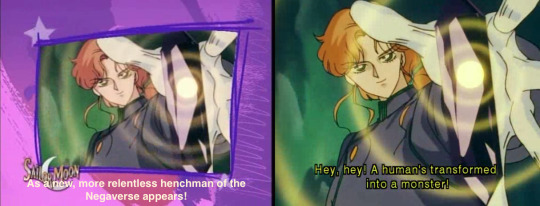
After so long, here is part two!!
Because of the massive break in between the two, I’ve had to switch gears a little with my explanations, but hopefully they’ll still appear coherent! Without further ado, the remainder of this episode of Dub vs. Sub!
Previously, I covered the manners in which the episode begins to establish the foundation for both diverging character arcs. Propped with knowledge from both Beryl and Kunzite, Zoisite takes his charge with perfect grace and professionalism. Meanwhile, DiC's Zoycite is introduced as being far keener, promisingly relentless, and a more dangerous adversary. If Zoisite was concealing his fangs, as it were...then we were introduced to Zoycite flashing hers.
If it sounds like I'm bashing a dead horse with this difference a lot, perhaps it's also because the DiC dub seems to do so with as much vigor. Certainly, I can't assume writers' intentions when they re-wrote the character for DiC. However, DiC seemed to find as many opportunities as they can to showcase Zoycite's contrary presentation of Zoisite's original character as often as they can, even when they didn't necessarily have to...
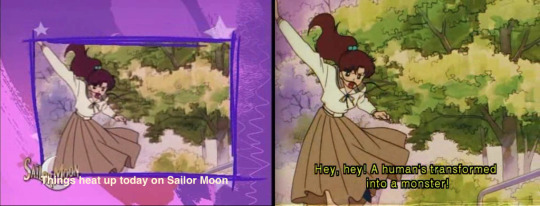

This bit of exposition was given right at the very beginning of the DiC version when no such introduction was made in the original. Possibly, DiC made this change to ramp up the story's dramaticism. However, DiC's reputation for obvious exposition leads me to believe otherwise, especially when it starts cropping up in later episodes more frequently, and for no other reason.
(For example, yes, I understand that the following screenshots are referring to Lita / Makoto. However, if you look at Zoycite’s arc as a whole, it is also an excellent setup to the infamous “Disguise” episode...and I feel it is also a great representation of why DiC so desperately wanted to sow these character changes into Zoycite. For if they hadn’t, and Zoycite remained exactly as Zoisite in all manners except gender... how different would “she” be, a beautiful female soldier fighting for love, than another titular character we know?)
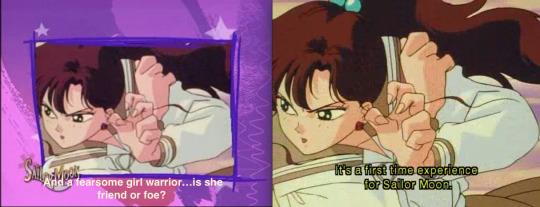
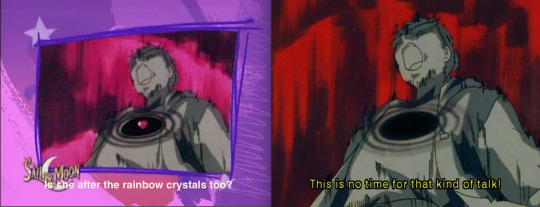
Anyways, I digress, and will return to the above bracketed point once we reach that particular episode. In the meantime, please enjoy the following comparisons remaining from the episode below...
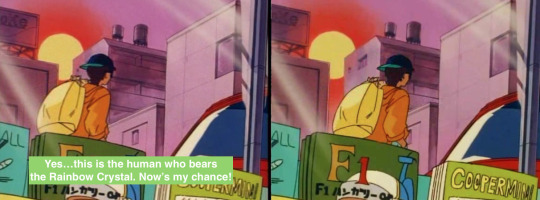
1. Zoycite’s keenness, and further proof that DiC can’t stand empty sound space, even if it’s to imply a character’s softly - and ominous - coming).
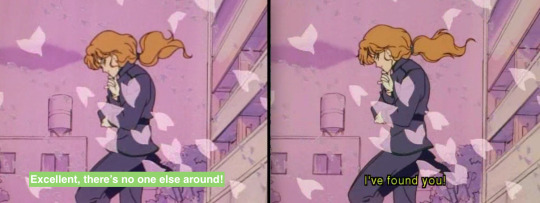
2. I wish there was a way I could put audio clips in these tumblr posts, because I do love how both these characters are still portrayed with a sense of play...Zoycite’s acrid, saccharine poison, and Zoisite’s breathy, cotton-candy kiss of death.
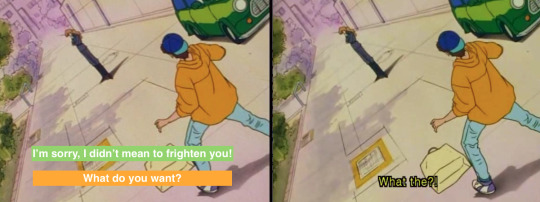
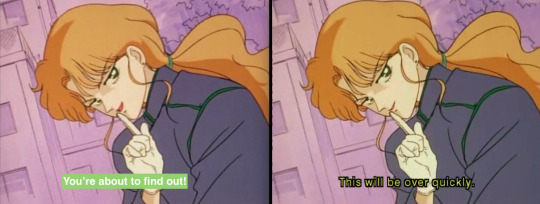
3. If I could put in audio clips, this is where we would hear Zoycite’s syrup literally curdle - her voice rips into an edge of monstrous roughness, similar to other other monster-of-the-day characters that were also portrayed by the same actress. Meanwhile, Zoisite’s actor speaks with a softness of a snake beginning to gently suffocate you..
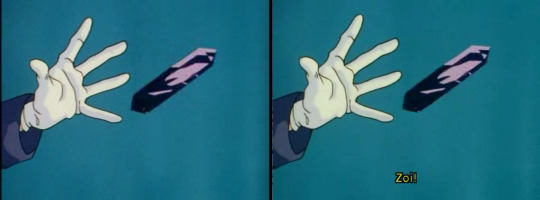
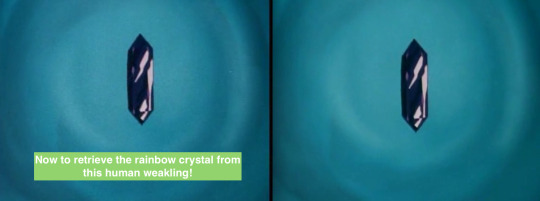

4. Goddamnit Zoi, you are so fucking cute, I will never get over how you call out your own name like you’re a fucking pokemon <3.
(Side Note: Zoisite’s use of his own name may seem vain, but I tend to read it less as a form of vanity, and more of a form of cute-speak. It’s yet another way he downplays the perception of his potential: to evoke the sense of adorableness, of femininity, a way to startle the opponent into a sense of lowered security. Honestly, I’m sure this isn’t so much of an actual farce he puts on and is genuinely how he expresses himself, both on the job and at home, but it works! Note that in the future, whenever Zoycite uses the same tactic, she never says it in the same, diminutive cute way. Her spell-cast is always aggressive, shouted in determination and confidence).
(Extra Side-Note: Another +1 for how many times Zoycite will say she is excited to please Queen Beryl. I’m keeping count for an explicit reason. Infer that what you will, and please imagine it with the same kind of “ding” that’s heard in CinemaSins.)
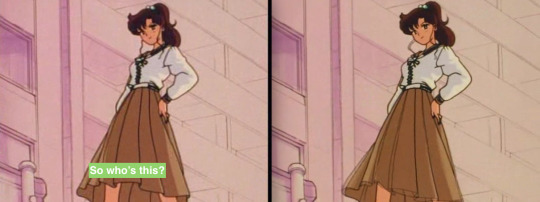

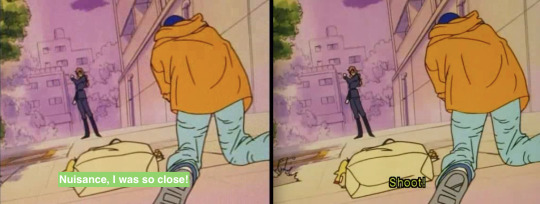
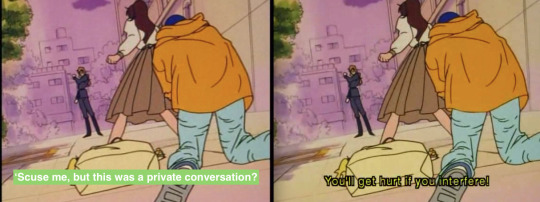
5. I mean, apart from the usual (Zoycite’s kneejerk reaction is to be antagonistic, while Zoisite is actually only politely informing Makoto that she does not have to engage, etc, ...he literally does not coax, mock or challenge. We will see later that Zoisite treats physical bloodshed and confrontation as unnecessary and only as a last resort, while Zoycite is spurred by challenges) - I also love how Zoycite’s dialogue also reflects this difference. I’ve talked at length at how Zoisite is always unfailingly and elegantly polite before, and now look at Zoycite’s speaking mannerisms: uncouth, aggressive, and filled to the brim with attitude when the opportunity arises. ‘SCUSE ME, indeed!
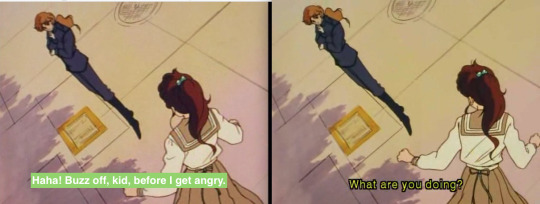
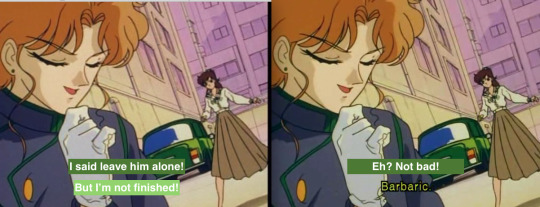
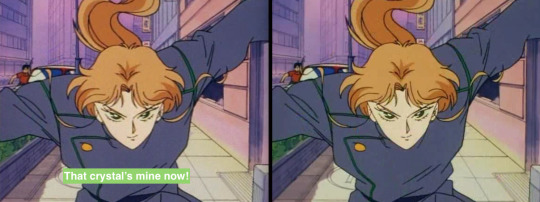
6.Further point regarding Zoycite and Zoisite’s divergent opinions of physical or violent confrontation: one disparages it, considering it barbaric, and that he is above it (often literally). The other laughs in the face of it, and has no qualms dishing it out as a threat...or is more than ready to follow it through.
(Also: buzz off omfg)
In fact, we see their opinions play out beautifully below:
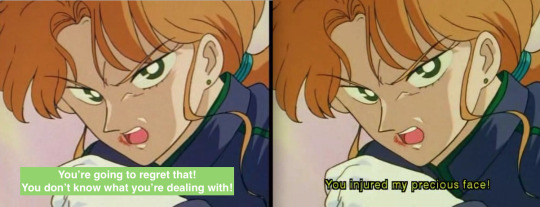
7. After being punched, compare these reactions: one promising brutal threat, and the other fucking gobsmacked it even happened. Also, their differences in priorities.
While that may sound like I’m making a dig at Zoisite, I am legitimately not. I know this scene tends to be one of the ones that famously evoke the idea of Zoisite’s vanity, but I tend to read it another way. Yes, Zoisite’s face is precious to him, and yes, it could also be read as a stereotypical portrayal of a feminine gay character.
However, this scene is not meant to illicit laughter. Nor it is not meant for us to startle with incredulity of how silly it is that he is upset his face his hurt. In this scene, Zoisite is truly shocked - his words are less an angry tantrum and more a statement of startled fact. He hadn’t anticipated Makoto could get that close to him, could actually touch him, much could actually strike him. And, in a place that is fiercely protective of, not because of his vanity...but because it is a precious commodity in the main force that drives his arc. (Yes, it’s Kunzite.) It’s no surprise that Zoisite’s beauty and “beautiful face” gets mentioned so often at key moments in his character development. His arc starts with a punch in the face, rises with gentle caresses, and - after a similar injury - crashes.
All of these subtleties, however, are swapped entirely in Zoycite’s case. Her face is not a fragile commodity by which she holds dear...in fact, it is of little importance to her. Her immediate concern is vengeance - more so than the injury on her face, it is her ego is bruised, and damn anyone who dares to make that mark.
Anyways, before I digress further, let’s round back up to the remainder of the episode. These last few scenes only continue to consistently show the differences in Zoycite’s and Zoisite’s professional approach. There isn’t as deep to note, with one exception at the very end...
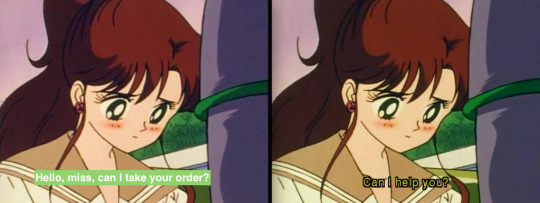

8. If you haven’t already caught on, Zoycite really wants this fucking crystal.
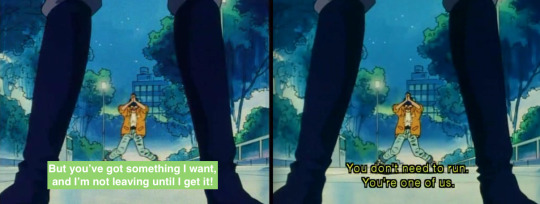
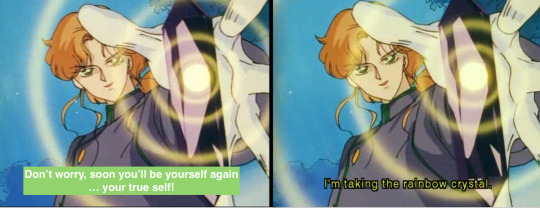
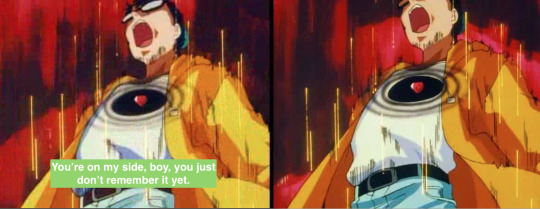
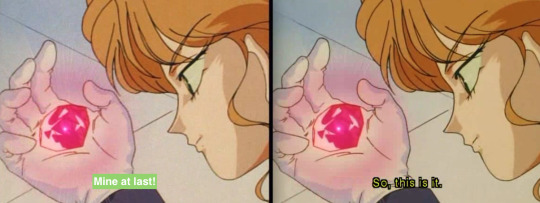
9. Up above, DiC makes as much of an effort to showcase how much joy Zoycite derives from her job. Being a Negaverse warrior is an excellent honour - your true self - and boy, is she enjoying exerting her power over those below her. Zoycite’s ambition is demonstrated not as an ideal professional characteristic, but the potential in her to throw a coup if she wanted to. She is power hungry, and that grows recklessly to dangerous heights as her arc progresses. Notice that Zoisite says none of these things...because it isn’t power he seeks. He approaches his subject with almost professional indifference: he seeks no more than the objective of his task. And don’t worry, “it will only take a moment”.
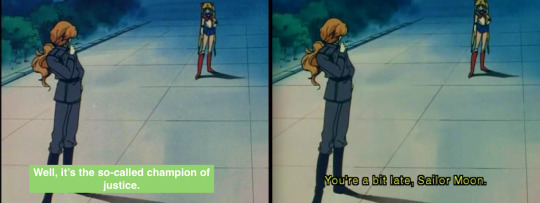
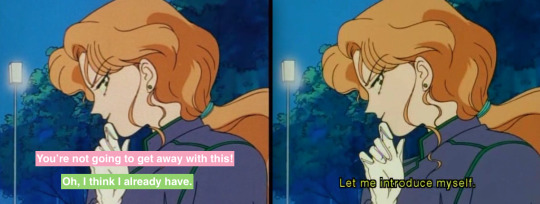
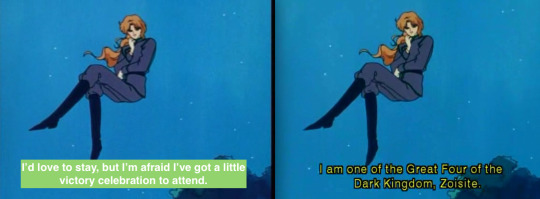
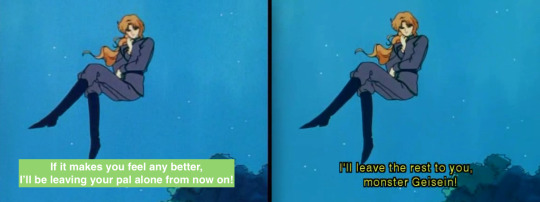
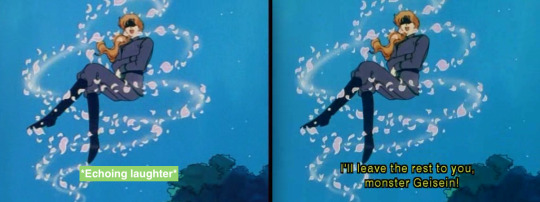
10. This has always been one of my favourite scenes. I just love how Zoisite politely “nopes” out, while Zoycite - and I fully believe it - has a fucking victory celebration. (Don’t think for a moment Zoycite is just jesting, she probably told Malachite to set out the champagne before she left on the mission!)
And again, note the increased victorious laughter, where there was none before...
And FINALLY, the one ODD thing that happens a LOT throughout DiC’s version of this character arc. Remember how I mentioned in a previous instalment that DiC seemed to like to inject extra dialogue and laughs that could exposit Zoycite as a fundamentally meaner character than Zoisite?
Hey look, it happened again:
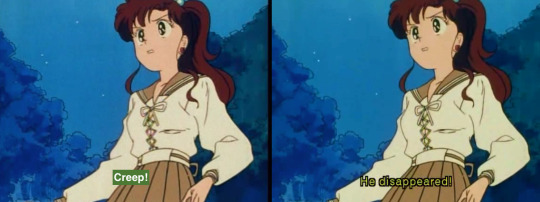
Like, this may not seem like much of a deal, but think about it. We had a scene earlier where Zoisite’s words basically remained the same in conversion (the “order” scene). We’ve had many instances where the original dialogue/script did not need to be changed, and yet was tweaked in just certain places. This seems like a wholly unnecessary change, so why do it?
The answer is: in changing Zoisite’s gender, DiC encountered a whole other problem. And that problem was: a female solider character, who’s primary motivation was love, a love that could be read as more complex, established, and equally both inspirational and problematic ...could end up becoming an unintentional role model for DiC’s demographic. Figuratively speaking, the tragedy by which we all love Kunzite and Zoisite’s humanity for carried a message that DiC feared might be misconstrued as another example of a miracle romance - because at that point, superficially, the character would no longer be any different than Sailor Moon. iIf Zoycite also fought for love, then her motivations would blow a hole right in the Power of Love message that DiC’s Sailor Moon stood for. And, if she was as dedicated to Malachite as Zoisite was to Kunzite - questionably so - it would also rip a massive hole in DiC’s message of Girl Power.
I’ll talk more about this in greater detail as those essential scenes crop up throughout the arc. For the time being, let’s simply observe that for all the animosity Zoycite gets in the DiC version (even by other characters in the same universe), that Zoisite was never perceived in the same way, even by his enemies. And there’s a reason for that.
#DiC Dub vs Sub#DiC Dub vs Sub Analysis#DiC Dub Analysis#dic sailor moon#90s Sailor Moon#Shitennou Syntax#Dark Kingdom Meta#Negaverse Meta#bssm sailor moon#zoisite#kunzite#zoycite#malachite#episode comparison
25 notes
·
View notes
Text
DiC Dub vs Sub Ep 17/21 “An Animated Mess”/”Protect Children’s Dreams! Friendship Linked by Anime”
Aaand I’m back! Heads up, this is a super long post because there’s also a Zoisite-Syntax essay in here too!
So to recap (because I’m not necessarily doing these in order, some are just more meatier and funner to get to than others): In the last episode, the Zoy/Zois have tried to get Nef/Neph in some serious trouble, and it backfired. +1 for Nef/ph.
So in this episode, it seems like their rivalry has stepped back in intensity a bit. Zoy/Zoi appear to be more chilled and less heckly, and Nef/ph seems to be either riding on the confidence of showing Zoy/i up in the face from the last episode, or otherwise doesn’t care. It sets up a really nice scene, actually, because it’s refreshing to see these two villains in a civil-ish behind-the-scenes interaction once in a while.
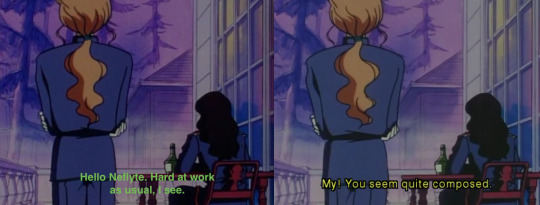
Zoy/i enter. I know there’s no audio, but I love Zoisite’s “Ara!” when he says “My!” Like, I can’t get over how like, very high-society-gossip his voice is. “My!”
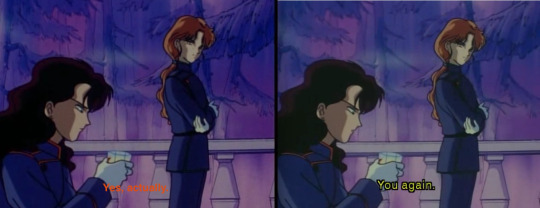
Interesting how once again, they changed the script so Neflyte appears more sympathetic. By saying “Yes actually,” it makes Zoycite appear more like the heckler. In the original Sub, Nephrite responds with “kisamaka” - a disdainful, dismissive “hmph, you again?” sort of meaning. Like, I can’t iterate how much I get the impression Nephrite finds Zoisite more annoying than Neflyte finds Zoycite, even though Zoisite is honestly not even as intrusive as Zoycite is.
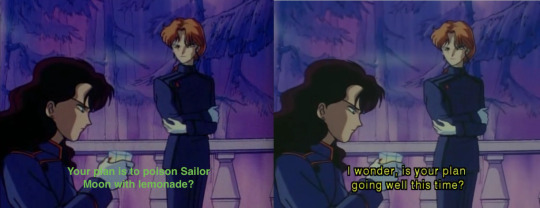
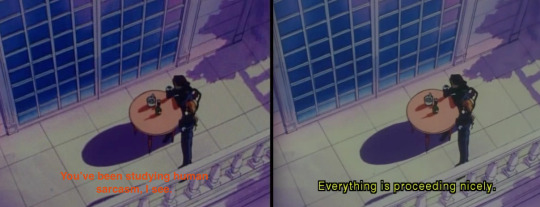
Okay, what’s interesting in the Sub here, there actually is no sarcasm or sniping back-and-forth (unlike the Dub). This legitimately seems like a civil conversation. Like there’s no background music, no evil theme song. It can almost be seen as two colleagues checking in on each other. Almost. My take is that Zoisite’s temporarily laying down arms a bit to recalibrate how he’s going to approach the rest of their dynamic in the future. And Nephrite’s letting him because he’s still riding on the confidence from one-upping Zoisite from the last episode...and also because he really doesn’t think Zoisite’s much of a threat.
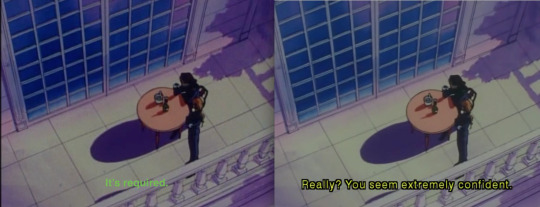
Ahh, infamous dub words.
That aside, I feel like the subtitles don’t really capture the softness and coyness in which Zoisite’s saying these words. Like, when we read them in English, they seem really straightforward and almost...ballsy? Whereas the impression I got when I was listening was more like “Oh? Well, don’t you seem extremely confident.”
Which would make more sense when you consider his next line:
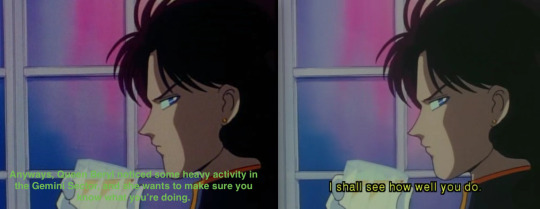
Ok, this is one screenshot in which I definitely would have translated differently.
As usual, Zoycite comes off as more domineering and over-lordy. She’s practically trying to assert herself as Neflyte’s supervisor on behalf of Queen Beryl. When you read Zoisite’s subtitles, you might assume the same thing, because his statement seems super pretentious in English. “I shall see how well you do”? Who the fuck is he to assume such power? If we were take the English subtitle as is, we’d probably assume he is acting on behalf of some other power (Beryl or Kunzite, your pick).
Except, I don’t agree with how this line was translated. It’s very likely I’m misunderstanding some social context with this line (since I’m translating nearly word-by-word) or how it’s used, but, the way I interpret it is very different.
So in this scene, what Zoisite actually says is:
お手並み拝見させていただくわ
otenami haiken sasete itadakuwa.
So otenami haiken means “Let’s see what you got” or “Let’s see your skill in this match” kind of thing. You’d say it to your opponent in a game, or in a drinking match. It’s kind of sarcastic, like how you would expect in English. By using this term, Zoisite is actually referring a match - a literal match, their rivalry. He isn’t checking in on behalf of Beryl, or supervising Nephrite. He is literally saying We’re both playing this game and now it’s your turn: why don’t we let’s see what you’ve got.
The second thing I’m picking up on (that the subtitles can’t) is how Zoisite conjugates the rest of his sentence. Most importantly, his use of the words sasete itadaku, which is an example of keigo speech: super polite speech that you would use for business, colleagues, clients or anyone on higher on the hierarchal ladder than you. It’s also like, super ...humble? Like it basically would read like this:
(Please allow me to) see what you’ve got.
Except Zoisite’s not...actually meaning it? He’s not really asking for Nephrite’s permission. The type of language he’s using is more like he’s ostensibly asking permission Nephrite to let him watch. It’s like, Zoisite being super polite and passive-aggressive all at once.
The irony, is, though, that Zoisite isn’t entirely outright being sarcastic. At least, I don’t think he is. Why? I mean, he’s in private, he’s not in front of Beryl, and we all know he doesn’t like Nephrite - so really, he doesn’t have to be polite to Nephrite. And of all the Shitennou, does anyone think Nephrite would give a fuck about the proper way one should be speaking to someone on the hierarchal ladder? Fuck no! This is the guy who can hardly keep it together professionally even with Beryl seething at him from the opposite side of the crystal ball. So why does Zoisite do this?
I think, the poor boy can’t help it.
I think Zoistie’s mannerisms - his feminine speech, his polite airs, his professionalism and his by-the-book manners - I think all of this is just him. It’s intrinsic in him, and his best strength: It’s his only way of playing the game: appearing to keep by the rules, keeping his nose clean, looking like a team player and just overall an impeccable fellow, while hiding his true capabilities and ruthlessness inside. This is how he’s even described in official merchandise books: “deceptively gentle, like a fanged beast ready to strike.”
And yet, ironically, this is probably what drives Nephrite bonkers. Since Nephrite is the kind of guy who speaks exactly what he thinks and puts no air or fake graces, Zoisite’s behaviour is exactly the kind he would detest. He can see how fake Zoisite is behind his “civilized” manners (see how Zoisite, in later episodes, likes to differentiate himself from other “barbarian” youmas), and probably finds him weak and spineless by doing so (not to mention pairing with Kunzite). Essentially, this is where I often get my Neph/Zoi Older-Brother-Younger-Brother headcanon from: Zoisite is that pesky younger brother trying to compete with the rest of them, and Nephrite is up to here with babysitting. He’d probably have more respect for Zoisite if he just grew up. But, Nephrite’s ego also thinks Zoisite is nothing more than that: just a silly little brother, trying to pretend he’s big enough to play with the big boys...and thus, he lets him in to watch how it’s done, without really considering the consequences.
OMG that was super long. Let’s continue on with the rest of the episode. I swear I’ll be fast.
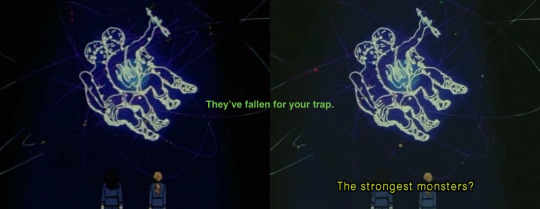
(Please excuse my error in screencapping) But look! Zoisite is practically “learning”.
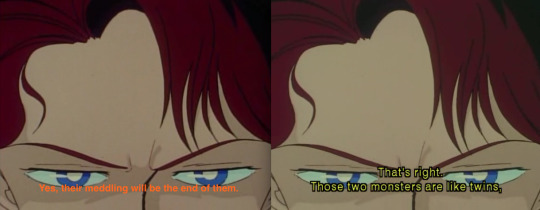
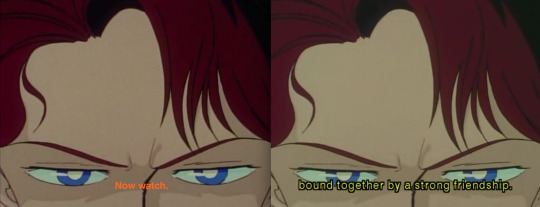
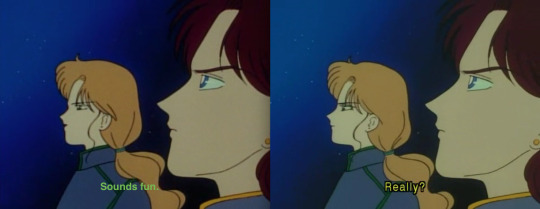
Note how Zoycite is still approaching this as if she expects Neflyte to fail, and is waiting for it. She might as well be eating popcorn. Zoisite, on the other hand, remains coyishly neutral. I think he’s using this time to really get a sense of what Nephrite is made of.
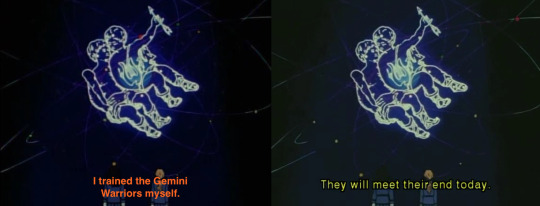
I think I’m beginning to understand what Naoko meant when she said that Nephrite had the biggest “elder brother” type of ego. He seems very sure of himself like all the damn time, even when his track record isn’t the best.
And when it blows up in his face...
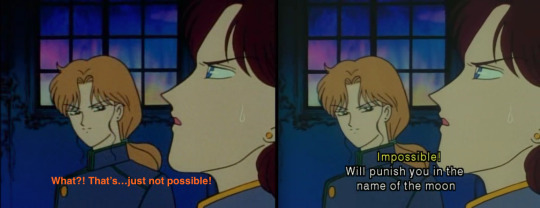
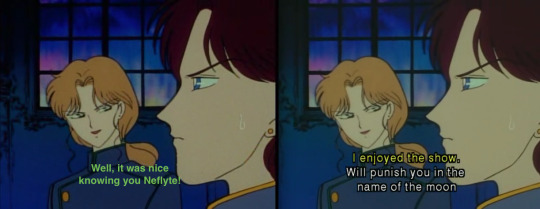
Zoycite, classy as always. (<--That’s me being sarcastic)
Zoisite, definitely classier, but HOHO. Like, the subtitles are totally correct, but I feel like in English, a combination of his polite+sarcasm would sound more like “Thanks for the show :)”.
So tldr, while Zoycite is nailing human sarcasm, can we talk about the aristocratic-level of sarcasm we’re getting from Zoisite here? God I want to see this boy sass over a cup of tea.
#DiC dub#zoisite syntax#shitennou syntax#shitennou syntax analysis#dub vs. sub#DiC Dub vs Sub Commentary Watch#episode comparison#character analysis#DiC Dub commentary#theories#neflyte#nephrite#zoycite#zoisite#sailor moon classic#long post#headcanons
66 notes
·
View notes
Note
This may be a stupid question but... why does Zoisite always call Kunzite 'sama'? I mean, if they're boyfriends, he could be a bit more informal, right? :D
Hi Anon!
Apologies for my late response, it’s taken me some time to collect my thoughts on this 2-part question! It’s quite loaded as well, so hopefully my answer makes some sense despite all the different topics it navigates.
The short answer is: Zoisite always calls Kunzite “-sama” because it indicates a certain level of respect based on age gap, rank, and power, with a dash of personal admiration and idolatry. Zoisite uses this term because he must. He cannot be informal. They are not boyfriends.
The long answer (explanation) is: Loosely speaking, the suffix “-sama” is used whenever someone greatly respects (or should greatly respect) the person they are addressing. This can manifest in various situations: from an apprentice to a master, a student to a great teacher / mentor, a servant to a lord, etc. It can also be used in situations of great reverence, such as in the case of fans to their idols, or to a crush who is distinctly older (both Naru and Usagi refer to their respective adult crushes - Sanjouin Masato and Tuxedo Kamen- as such).
In the case of KunZoi, the interpretation of the “-sama” suffix originally rose out of a literal assumption that Kunzite was literally Zoisite’s “master” or teacher. The subs imply this, and in conjecture with the English dub at the time (wherein Malachite explicitly states that he is meant to teach Zoycite), it was wildly assumed that Zoisite uses this term because it is part of Kunzite’s “title”, or because he respects him for said title. I would argue that Zoisite doesn’t use it strictly because of protocol - instead he uses it because he gladly chooses to, because his affection and admiration for Kunzite encompasses all the different ranges in which that suffix is used. Kunzite isn’t just his teacher - he’s also distinctly older, his superior, and the object of his (near fanatic) adoration. That’s the first reason why Zoisite cannot (or will not) drop the suffix.
The second reason is directly due to their current relationship status. Assuming that they were on a conventional trajectory with their romance, eventually there should come a point when they feel enough intimacy that the suffix is no longer a professional courtesy or a necessity (see Usagi progressing from Tuxedo-Kamen-sama, to Tuxedo Kamen, to Mamo-chan). The problem is that KunZoi are not on a conventional trajectory. Although they are clearly intimate, it is obvious that love and their romance status is not a thing they speak about. There has not been a “talk” or a recognition that they are even in a relationship of that nature…otherwise Zoisite would not have the need to “prove his love” in the later stages of his arc and in the sound dramas. At this stage, they are lovers, not boyfriends, and they certainly do not rest in equality to one another. Kunzite will most likely outright deny that Zoisite is his boyfriend (opting for his literal position to avoid the emotional baggage that comes with the word), while Zoisite just wishes Kunzite is his.
Finally, the third reason is due to culture. Emotions are not an easy topic to talk about in Kunzite’s and Zoisite’s world. To avoid embarrassment, it is also likely that Zoisite chooses to use the suffix in order to put up a “professional” buffer zone between the two of them. So long as he uses this suffix, the ambiguity of its meaning allows him a chance to claim professionalism as an exit strategy, should Kunzite ever indicate that he is uncomfortable with their intimacy. The barrier is complicated and vaguely superficial - only there for the sake of comfort - but it is what gives KunZoi that fissure of interest, that texture of intrigue. They are not entirely a happy, easy couple, although they have the full potential to be.
Thank you again for the question Anon!
46 notes
·
View notes
Text
綺麗 (きれい) に...
Since we’re all in this mode (omfg feels), let’s take a moment to read what Zoisite requests in his final moments.
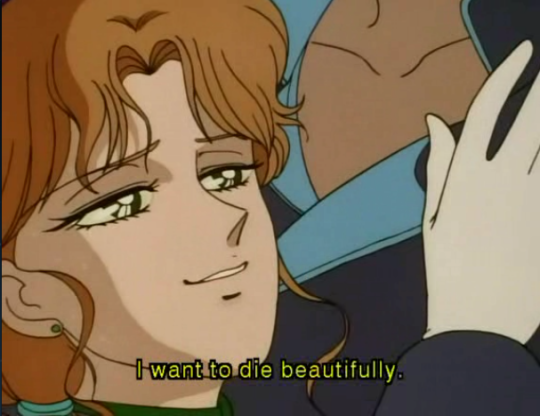
This is the most popular translation of his dying words (綺麗 (きれい) に死にたい). It’s also the translation that is usually used to show Zoisite’s vanity, or his obsession with beauty, or dying dramatically/romantically/young. Which is a logical takeaway; the translation is most likely the most correct one.
But let’s break it down and consider the other ways it can be interpreted, because some of them open up some even deeper, and more tragic undertones to this scene.
The phrase “kirei ni” (きれい に) is the section I want to focus on the most, as it leaves the most room for interpretation. Kirei (きれい) , by itself, means pretty, beautiful. When tacked onto an adjective, the word ni (に) transforms adjective into an ad verb. It is used to imply a way, a manner, a method. In this way, the translation that makes most sense is that Zoisite wanted to die “prettily”.
However, the word ni (に) is also a marker, usually used to imply existence “in” a space, a location. If we consider this translation, Zoisite is actually requesting that he wishes to die “in a pretty space”, which is most likely the interpretation Viz was using.
If we consider for a moment that the second interpretation is what Zoisite was requesting, this opens up a whole realm of new questions and possibilities, the most significant being that the garden of roses and petals is what Zoisite considers most beautiful.
Contrast this to his partner’s idea of beautiful:
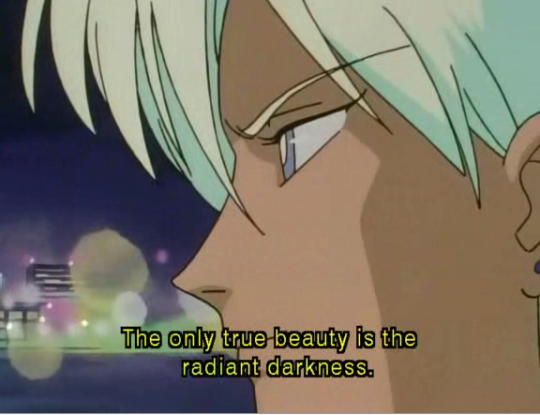
What Zoisite considers beautiful and what Kunzite considers beautiful are literally polar opposites. Which means that this entire time, Zoisite had been sacrificing his idealism and his preference of a world he loved, felt more comfortable in, enjoyed and appreciated, for a world that literally was exact opposite. He sacrificed and compromised his idea of a perfect world for Kunzite’s idea of a perfect place.
(Oh my god. (This makes those goddamn corpse flowers and the jungle so much more heartbreaking in this context!))
The second revelation though, now that we know this, is this: Kunzite knew it.
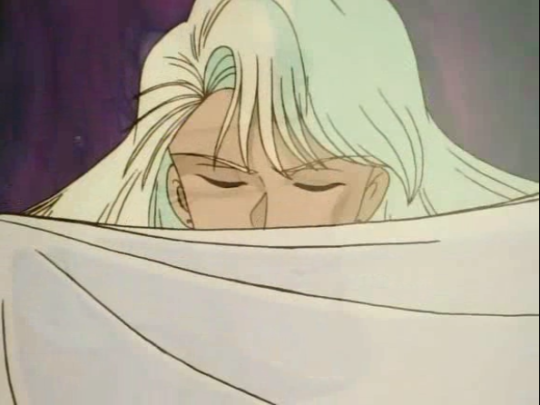
Without hesitance or clarification, he granted Zoisite his wish. He structured this environment perfectly. He knew exactly what Zoisite’s vision of a perfect place was and he gave it to him.
All this time, Kunzite knew Zoisite was compromising his own ideals for his.

(It’s a bit hard to see in this picture, but look at Kunzite’s face. If that’s not the look of distant remorse, I don’t know what is.)
Now knowing that this is the only time Zoisite ever got to experience his idea of a beautiful place, it only makes the dynamics between these two all the more heartbreaking. Can you imagine the original discussion they must’ve had in the Golden Kingdom, about what they believed utopia was? Because unlike Zoisite, Kunzite truly believed in his vision that Metallia and her subsequent darkness was the best environment for the world. For Kunzite, he would give up his own life and honour before sacrificing such a dark, black utopia. Instead, Zoisite gave up his perfect world, one of brightness and flowers and love, for Kunzite.
When Kunzite asked for forgiveness, I don’t believe for a second that it was just his inability to protect Zoisite from death. It was for so much more.
382 notes
·
View notes
Text
Short Zoisite Syntax Observation
So, I was chatting to a good friend of mine who is much more fluent in Japanese than I am, and we were talking about how Zoisite spoke. And she pointed out an excellent observation that I had forgotten:
During that time, Japan had generally two threads of conjugations; one for men, and one for women. The way Zoisite speaks, he can be considered either as
a) a very polite man or
b) a very bold woman
And it’s interesting to note, that Zoisite basically rarely exceeds this level of “masculine-politeness” (as in, he rarely uses the more confrontational masculine conjugation that Neph, Kun and Tux Mask would use).
And, considering that his two favourite words are kuyashii and hidoi (which were stereotypically very femininely used expressions), I think we can safely conclude that Zoisite doesn't just speak politely for polite’s sake: he also does it because it’s dainty and girly <3.
#shitennou syntax#zoisite syntax#zoisite#classic zoisite#classic Sailor Moon#aww you're so cute zoisite
37 notes
·
View notes
Text
Shiranai (知らない)
As you all know, one of my hobbies-within-a-hobby is analyzing Zoisite’s speech patterns. In general he tends to err on a fairly formal and polite side of speaking (even when he doesn’t have to; like, when he’s wailing for Tux Mask to stop after stealing a crystal), and consistently tends to be just as polite and formal with his lover and superior officer, Kunzite.
Which is what makes this scene gold.
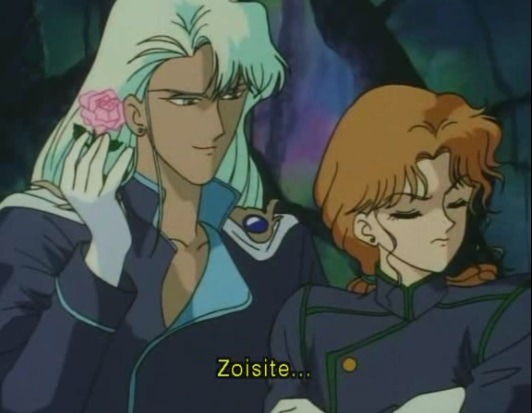
We all know the scene! Kunzite offends Zoisite by commenting on the beauty of another, and Zoisite is very much upset. Kunzite tries to smooth his faux pas and Zoisite responds by saying the following:

Now, the term that Zoisite uses here is “shiranai” ( 知らない) which is pretty much “I don’t know!” in Japanese. (Example, if a friend were to ask you if you knew where the bathroom was and you didn’t, it would be perfectly normal to respond using “shiranai”.) Since Japanese is a very concise language, it’s ambiguous to us in English what Zoisite could mean by “I don’t know-” without a specific subject ... does he mean “I don’t know / understand your gesture”, or does it mean “I don’t know (you anymore)!” (I tend to agree with the latter) .
Either way, what is gold here is that this is the one time Zoisite drops all polite suffixes.
This one time, Zoisite is using the informal form of a word.
This could mean so many so many things!! So far I’ve interpreted it as one or any of the following:
1) That Zoisite is genuinely so pissed off he does not give a fuck about being polite/formal/showing the usual level of respect he normally shows Kunzite
2) That Zoisite knows, in actuality, that he and Kunzite are that familiar/close to each other that he knows Kunzite won’t genuinely be offended
3) That he can actually reject Kunzite with these words, and (as we all know, Zoisite would never actually want to), and he knows Kunzite will still stay!
To reach this level of trust, to abandon his usual propriety in front of the man he would do anything for... they must have had this conversation before, in order to reach the understand that they both can read it as it meant to be read. To me, this scene not only shows how much they trust and understand each other as people, but it also suggests that this is a relationship that has been going on for a very long time, and it is very established.
For all of Zoisite’s pining, this scene shows that even though Kunzite may not have been aware of full extent of Zoisite’s unconditional love for him, their relationship was already pretty damn solid at this point. They were well on their way to that dream relationship Zoisite had imagined, even though the words had not been spoken.
That they reached a point that they know when Zoisite is hurt and annoyed, he naturally trusts, wants, and expects Kunzite to make it better. And Kunzite does, as always, happily and never begrudgingly, knowing that this is the dance they dance and he loves it.
It’s a dance of trust, understanding and love, and these two have been dancing for a long time.
#shitennou syntax#zoisite syntax#zoisite#kunzite#kunzoi#kunzite x zoisite#reading something in nothing again
269 notes
·
View notes
Text
At some point, I’ll write a more detailed linguistic analysis of Zoisite’s consistent use of the polite suffix, even in scenes when he should otherwise be raging.
For now, enjoy this screenshot of him running after Tux Mask, technically wailing “Wait pleeeaaase!!”
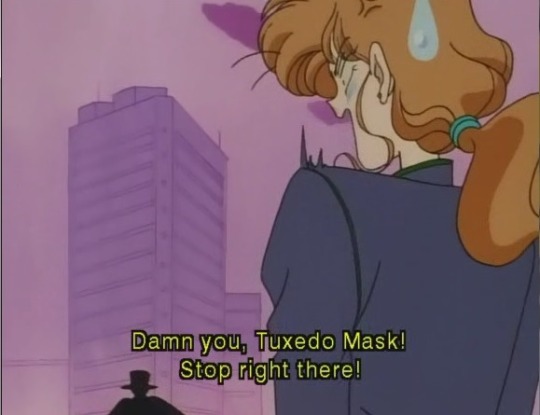
You know, instead of saying, “Get back here you f*cker!”
43 notes
·
View notes
Text
More Shitennou Syntax!
While we’re on this topic, I figured I’d throw in some syntax analysis about the other members of the Shitennou as well. First up, Nephrite!
As we all know, Nephrite’s primary character traits are his overconfidence and arrogance. And his use of language, completely opposite of Zoisite’s politeness, shows this.
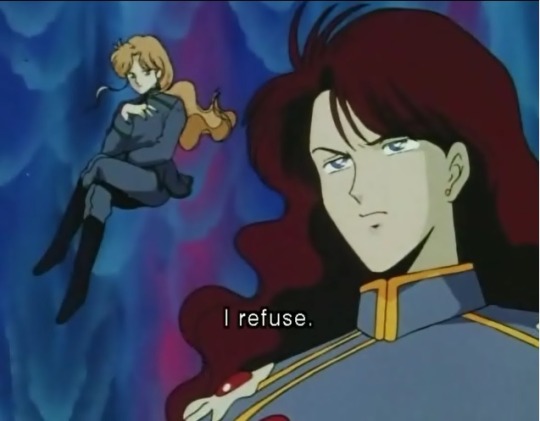
In this scene, Nephrite refuses Beryl’s suggestion that Zoisite should help him. He uses the word kotowaru (断わる). Although once again the subtitle is correct, the English translation doesn’t really make him seem all that bad. In English, “I refuse” seems to be a fairly reasonable, straightforward way to decline someone. But, I’d like to point out that if Zoisite were refusing something, he’d be attaching a formal polite suffix, making the word kotowarimasu (断わります). The fact that Nephrite uses no suffix whatsoever, polite or otherwise, is actually a grossly rude way for him to deny Beryl’s suggestion.
Essentially, although the subtitles are correctly translated, what Nephrite is actually saying is:
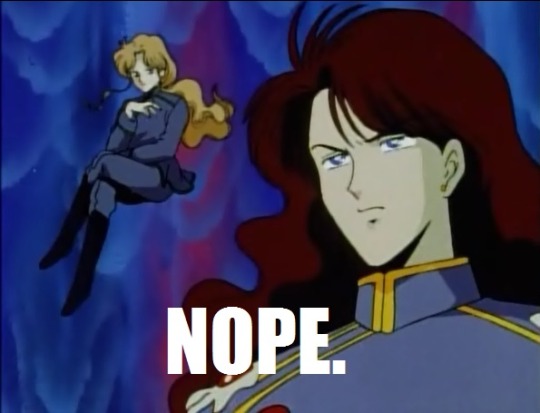
#no wonder these two didn't get along#zoisite#nephrite#shitennou#shitennou syntax#classic bssm#episode 18
79 notes
·
View notes